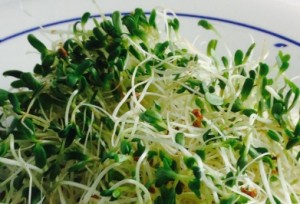 Washington and Idaho combined public health resources in 2014 to help solve an outbreak that spread E. coli O121 to people who ate clover sprouts at Jimmy John’s Gourmet Sandwiches, the Pita Pit and Daanen’s Deli, according to a review of state and federal food poisoning reports. “Raw clover sprouts produced by Evergreen Fresh Sprouts, LLC of Idaho was the likely source of this outbreak,” the Centers for Disease Control and Prevention (CDC) wrote in its final update on the sprouts E. coli outbreak.
Washington and Idaho combined public health resources in 2014 to help solve an outbreak that spread E. coli O121 to people who ate clover sprouts at Jimmy John’s Gourmet Sandwiches, the Pita Pit and Daanen’s Deli, according to a review of state and federal food poisoning reports. “Raw clover sprouts produced by Evergreen Fresh Sprouts, LLC of Idaho was the likely source of this outbreak,” the Centers for Disease Control and Prevention (CDC) wrote in its final update on the sprouts E. coli outbreak.
By July 31, 2014, 19 people in six states were infected with the outbreak strain of Shiga toxin-producing Escherichia coli O121, including three from Idaho, two from Montana and 11 from Washington state. No deaths were reported, but 44 percent of case patients were hospitalized after suffering lengthy bouts of bloody diarrhea and other symptoms. Five cases were reported in Washington’s Spokane County, two in King County, and three in Idaho’s Kootenai County, where one of the victims filed an E. coli lawsuit.
According to the agencies that studied the outbreak, the sprouts from Idaho were supplied to seven restaurants where 9 people initially reported eating before they became ill in May 2014. Eight of those people who became ill recalled eating sprouts. That started an investigation that included FDA site inspections of Evergreen Fresh Sprouts of Moyie Springs, Idaho. CDC said the inspection crew observed a number of unsanitary conditions, including: “condensate and irrigation water dripping from rusty valves; a rusty and corroded watering system in the mung bean room; tennis rackets (used to scoop mung bean sprouts) that had scratches, chips, and frayed plastic; a pitchfork (used to transfer mung bean sprouts) that had corroded metal; and a squeegee (used to agitate mung bean sprouts inside a soak vat) that had visible corroded metal and non-treated wood.”
The FDA had a talk with management at Evergreen and the company stopped using the seed lot linked to illnesses in the outbreak. Often times when raw sprouts are implicated in an outbreak of food poisoning, seeds were contaminated with the pathogens. Important scientific evidence in this case includes matching DNA “fingerprints” in the E. coli O121 isolates taken from all case patients.




